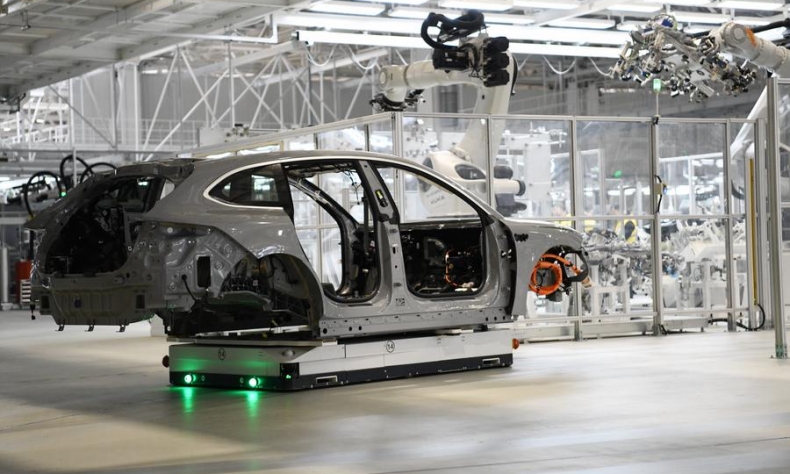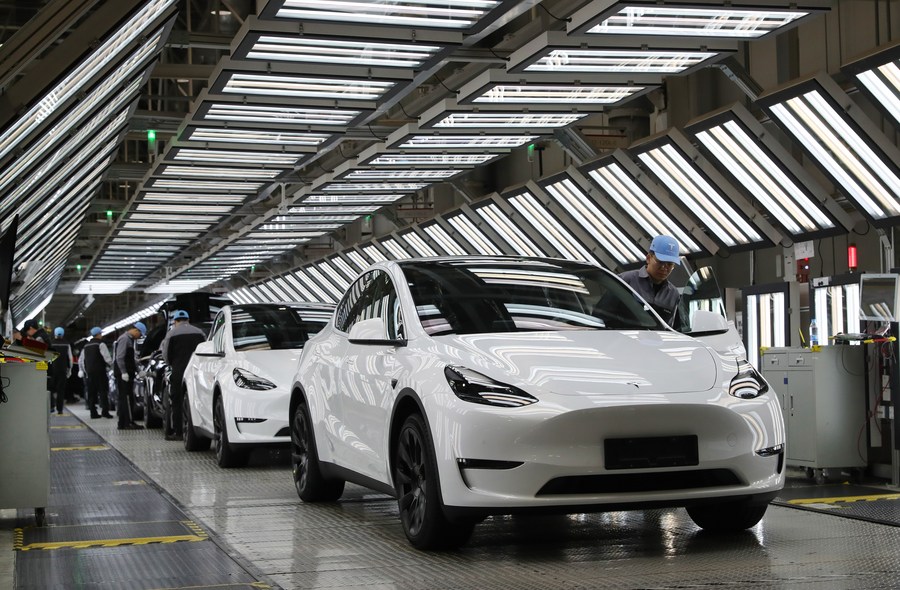European Demand for NEVs Remains High

China and Europe have extensive common interests and a huge space for common development in the field of NEVs.
This year, the International Energy Agency (IEA) published its Global EV Outlook report under the title “Moving Towards Increased Affordability.” It noted, “A rapid transition to EVs (electric vehicles) will require bringing to market more affordable models.” Last year, the global sales of EVs approached 14 million, an increase of 35 percent from 2022, accounting for 20 percent of sales of all automobiles. The top three markets were China (60 percent), Europe (less than 25 percent), and the U.S. (10 percent). One in three cars sold in China last year was an EV, compared with one in five in Europe, and one in 10 in the U.S. As a conventional leading auto market in the world, Europe has huge space for growth in the EV sector.
A driver of green transition
Development in the field of EVs remained stagnant until recent years due to rapid growth of the petroleum industry and slow progress in battery technology. After the international community reached a consensus to combat climate change, reduction in carbon emissions has become a focal point of global attention and action. The EU has set ambitious goals for green transition, declaring to reduce net greenhouse gas emissions by at least 55 percent by 2030. This entails sweeping efforts across all social and economic spheres, with the auto industry being of significant importance.
Being a leader in the production of petrol vehicles, Europe has been a supply-dominated car market where the development of hybrid and electric vehicles is sluggish. With their preponderance in the auto market, established carmakers in the region have dedicated their efforts primarily to upgrading the engine performance of petrol cars, improving their exterior designs, and reducing manufacturing costs. Little interest was shown in developing new-energy vehicles (NEVs) to compete with their existing lines of petrol models. The transition to green cars hence calls for change on the supply side.
In contrast, China’s NEV industry has made strong headway over recent years. On the back of a complete manufacturing system and soaring demand among domestic buyers, a cohort of Chinese carmakers have carved out a niche on the domestic market and gone on to gain reputation on the international market. Compared with internal-combustion engine cars, NEVs have the advantages of a less complex production process, closer interaction between manufacturers and consumers, and faster product upgrades. Their development is, however, also decided by the cost and national conditions. The fast growth in China is the result of advanced infrastructure and supportive laws and policies. The proliferation of charging facilities across the country, for example, has substantively brought down the cost of owning a NEV and significantly improved consumer experience.
Steady and sustainable development of the new energy sector is only possible when a country has a strong capacity for technological innovation and production and supporting services. As a key player in the international auto industry, China has built a complete auto manufacturing eco-system covering car batteries, energy storage, and Internet of Vehicles, laying a solid foundation for the manufacturing of NEVs. This situation allows for close cooperation between domestic companies at different points of the automobile industrial chains to meet the diverse needs of consumers and has also attracted foreign carmakers to set up R&D centers and factories in China.

A supply-demand issue, not an overcapacity issue
Recently, some politicians and media outlets in Europe and the United States have played up the so-called “China’s overcapacity” issue. They claim that the Chinese government’s subsidies have resulted in overcapacity in the new energy industry including EVs, which China is dumping overseas at low prices leading to market distortions and harming other economies. Last year, the EU launched an “anti-subsidy investigation” into electric vehicles coming from China.
The issue of production capacity was also raised during talks between Chinese Premier Li Qiang and Federal Chancellor of Germany Olaf Scholz in April. Li told Scholz that China’s new-energy industry has made progress through self-improvement and sufficient market competition, rather than by government subsidies. The high-quality production capacity that China’s new-energy industry continues to provide will make important contributions to global green development, he added.
The development of the NEV industry is still at an early stage and requires continuous investment in innovation. In business activities, innovators often face higher risks, so it is reasonable for them to expect higher returns and rewards as compensation. China’s NEV makers are brave innovators who have embraced new development concepts and continued to improve the performance and comfort features of their cars, especially in terms of endurance mileage and ability to cope with various types of road and weather conditions. These innovations have won the recognition of European dealers and consumers. Their feedback in turn has further accelerated the innovation in the NEV sector. As China’s NEVs enter more foreign markets, consumers wield greater sway over the supply-demand relationship, prompting these carmakers to better adapt to consumer needs.
In Europe, due to the income factor and consumer experience, EV purchases are not particularly high. The development gap between different countries in the region also requires modification of EV performance for different markets, which is a challenging task for carmakers. At the same time, out of concerns about supply chain disruptions, many European countries have made de-risking a policy priority. To reduce the risk of supply chain disruptions, many companies have changed their inventory strategy from zero inventory to appropriate excess stock and sustainable supply. For the NEV sector, efforts are needed to maintain a stable supply.
To meet market demand, a viable approach is to diversify supply channels, and Chinese NEV companies can be looked to in this regard. The European Union has higher standards for environmental protection, privacy protection, chemical content, and other issues. Chinese automakers meeting these stringent requirements and entering the European market fully demonstrates the strength of Chinese companies and creates a bond of mutual interest between European importers and Chinese exporters.
To facilitate development of the NEV industry, European countries should create a more favorable environment for all NEV companies, including those from China. In a market economy, businesses have to balance returns and risks in their operations and arrange for raw material purchase and production based on forecast of supply and demand in a fully competitive market. Although NEV manufacturers can respond faster to market developments and adjust production swiftly due to technological advances and their experience, the ability to adapt to demand is a decisive factor for profitability.
European countries have a long tradition of advocating openness and compliance with international rules. If all parties concerned along the NEV industrial chain can enhance collaboration to effectively align market supply with demand and reduce the delay or miscomprehension in information transmission, the risk of market miscalculation can be greatly reduced. According to their respective conditions, European countries should respond appropriately to build up the NEV industrial chain, encourage and protect innovation, promote reasonable and effective allocation of relevant resources between China and Europe, reduce governmental interference in corporate investment and activities, and create more cooperation opportunities for small and medium-sized enterprises. China and Europe have extensive common interests and a huge space for common development in the field of NEVs.
Zhou Mi is a researcher with the Chinese Academy of International Trade and Economic Cooperation.
 Facebook
Facebook
 Twitter
Twitter
 Linkedin
Linkedin
 Google +
Google +










